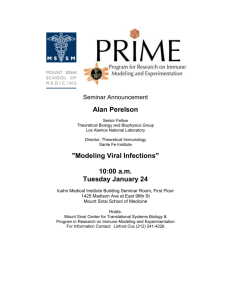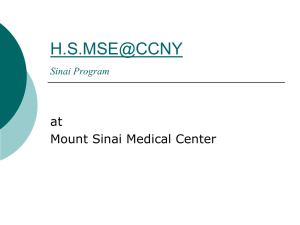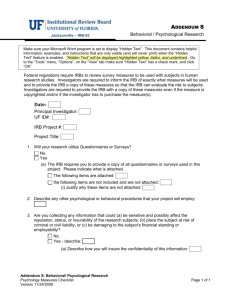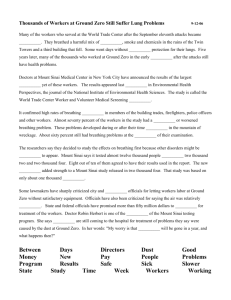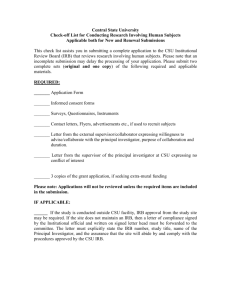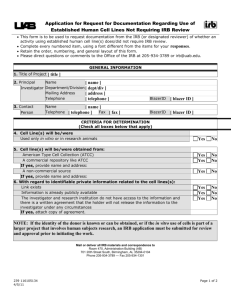human research protection program plan
advertisement
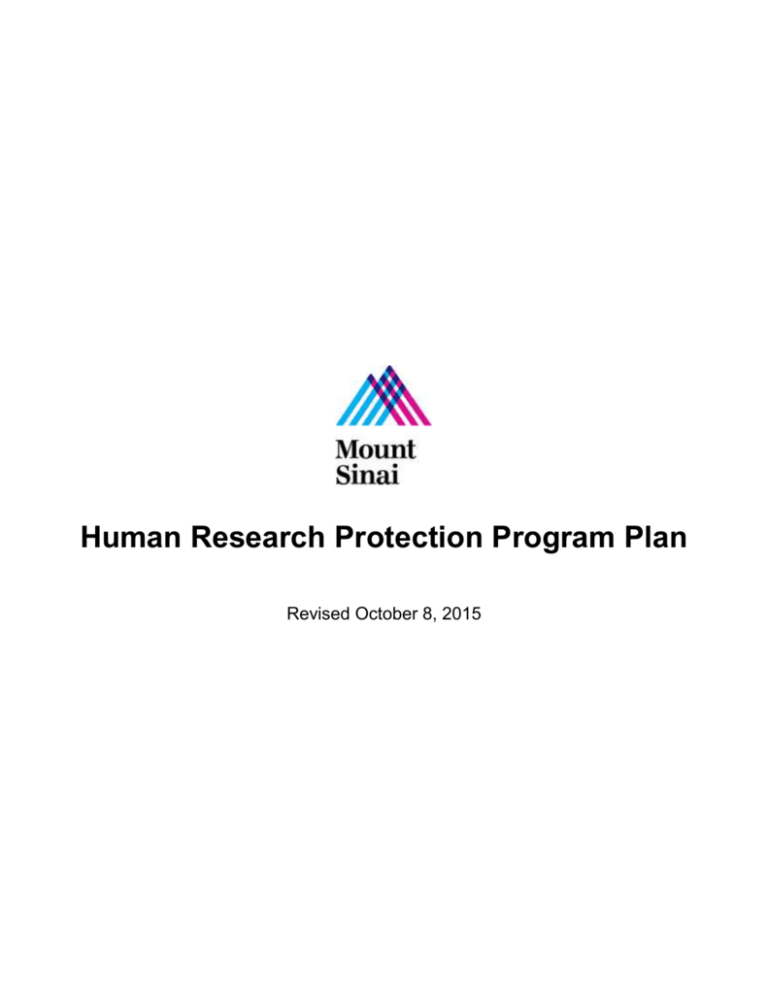
Human Research Protection Program Plan Revised October 8, 2015 Human Research Protection Program Plan Page 2 of 15 Purpose............................................................................................................................ 3 Definitions....................................................................................................................... 3 Agent ........................................................................................................................... 3 Clinical Trial ............................................................................................................... 4 Engaged in Human Research ...................................................................................... 4 Human Research: ........................................................................................................ 4 Human Subject as Defined by DHHS ......................................................................... 4 Human Subject as Defined by FDA............................................................................ 5 Investigator ................................................................................................................. 5 Research as Defined by DHHS ................................................................................... 5 Research as Defined by FDA ...................................................................................... 5 Mission............................................................................................................................ 6 Ethical Requirements .................................................................................................. 6 Legal Requirements .................................................................................................... 6 Other Requirements .................................................................................................... 6 Sponsored Human Research ....................................................................................... 8 Scope of Human Research Protection Program .......................................................... 8 Human Research Protection Program Policies and Procedures .................................. 9 Human Research Protection Program Components ........................................................ 9 Organizational Official ............................................................................................... 9 Executive Director, PPHS ........................................................................................... 9 All members of the organization............................................................................... 10 IRBs .......................................................................................................................... 11 Investigators and Research Staff ............................................................................... 12 Legal Counsel ........................................................................................................... 12 Deans/Department Chairs ......................................................................................... 12 Grants and Contracts Office...................................................................................... 12 Education and Training ................................................................................................. 12 Questions and Additional Information for the IRB ...................................................... 13 Reporting and Management of Concerns ..................................................................... 13 Monitoring and Auditing .............................................................................................. 14 Disciplinary Actions ..................................................................................................... 14 Approval and Revisions to the Plan .............................................................................. 14 Human Research Protection Program Plan Page 3 of 15 Purpose Mount Sinai is committed to protect the rights and welfare of subjects in Human Research. The purpose of this plan is to describe this organization’s plan to comply with ethical and legal requirements for the conduct and oversight of Human Research. Mount Sinai’s Human Research Protection Program is a comprehensive system to ensure the protection of the rights and welfare of subjects in Human Research. The Program for the Protection of Human Subjects (PPHS) is a key component of Mount Sinai’s efforts to ensure human subject protections. In addition, the overall Human Research Protection Program at Mount Sinai includes additional organizational, administrative, and investigator components, and is based on all individuals fulfilling their roles and responsibilities as described in this plan. Definitions Agent An individual who is a full-time employee is considered an agent of the organization for purposes of engagement in Human Research when that individual is on-duty in any capacity as an employee of the organization. This includes conducting Human Research in connection with his or her institutional responsibilities. An individual who is not an employee is considered an agent of the organization for purposes of engagement in Human Research when that individual has been specifically authorized to conduct Human Research on behalf of the organization. Individuals who are affiliated with the organization but are not full-time employees (e.g., voluntary faculty member, part-time medical staff member, or student) are agents of the organization when any one of the following is true: He/she conducts Human Research in connection with his or her organizational responsibilities. He/she conducts Human Research for which he/she interacts or intervenes with human subjects in organizational facilities or properties. He/she conducts Human Research that is to be used to fulfill any organizational requirements (e.g. course requirements); He/she represents Human Research to others either orally or in writing as being Icahn School of Medicine at Mount Sinai research, Mount Sinai Hospital research, or Mount Sinai Medical Center research. Legal counsel has the ultimate authority to determine whether someone is acting as an agent of the organization. Human Research Protection Program Plan Page 4 of 15 Clinical Trial Human Research intended to discover or verify the clinical, pharmacological or other pharmacodynamic effects of a drug or biologic, to identify any adverse reactions to a drug or device, to evaluate the safety or effectiveness of a drug, biologic, or device, or to study absorption, distribution, metabolism, and excretion of a drug or biologic with the object of ascertaining its safety or efficacy. Engaged in Human Research The organization is engaged in Human Research when its employees or agents are interacting or intervening with Human Subjects for the purpose of conducting Research. Mount Sinai follows OHRP guidance on “Engagement of Institutions in Research” to apply this definition. Human Research: Any activity that either: Is “Research” as defined by DHHS and involves “Human Subjects” as defined by DHHS (“DHHS Human Research”); or Is “Research” as defined by FDA and involves “Human Subjects” as defined by FDA (“FDA Human Research”). Human Subject as Defined by DHHS A living individual about whom an investigator (whether professional or student) conducting research obtains (1) data through Intervention or Interaction with the individual, or (2) information that is both Private Information and Identifiable Information. For the purpose of this definition: Intervention means physical procedures by which data are gathered (for example, venipuncture) and manipulations of the subject or the subject’s environment that are performed for research purposes. Interaction means communication or interpersonal contact between investigator and subject. Private Information means information about behavior that occurs in a context in which an individual can reasonably expect that no observation or recording is taking place, and information which has been provided for specific purposes by an individual and which the individual can reasonably expect will not be made public (for example, a medical record). Identifiable Information means information that is individually identifiable (i.e., the identity of the subject is or may readily be ascertained by the investigator or associated with the information). For research conducted or funded by the Department of Defense (DOD): When there is an intervention or interaction with a living individual for the Human Research Protection Program Plan Page 5 of 15 primary purpose of obtaining data regarding the effect of the intervention or interaction the data are considered to be about the living individual. For research conducted within the Bureau of Prisons: Implementation of Bureau programmatic or operational initiatives made through pilot projects is not considered to be research. Human Subject as Defined by FDA An individual who is or becomes a subject in research, either as a recipient of the test article or as a control. A subject may be either a healthy human or a patient. A human subject includes an individual on whose specimen (identified or unidentified) a medical device is used. Investigator The person responsible for the conduct of the Human Research at one or more sites. If the Human Research is conducted by a team of individuals at a trial site, the investigator is the responsible leader of the team and may be called the principal investigator. Organization The organization refers to The Mount Sinai Hospital, The Icahn School of Medicine at Mount Sinai, and The Mount Sinai Medical Center. For simplicity, the organization will be referred to in this document as “Mount Sinai”. Research as Defined by DHHS A systematic investigation, including research development, testing and evaluation, designed to develop or contribute to generalizable knowledge. Research as Defined by FDA Any experiment that involves a test article and one or more human subjects, and that meets any one of the following: Must meet the requirements for prior submission to the Food and Drug Administration under section 505(i) of the Federal Food, Drug, and Cosmetic Act meaning any use of a drug other than the use of an approved drug in the course of medical practice; Must meet the requirements for prior submission to the Food and Drug Administration under section 520(g) of the Federal Food, Drug, and Cosmetic Act meaning any activity that evaluates the safety or effectiveness of a device; OR Any activity the results of which are intended to be later submitted to, or held for inspection by, the Food and Drug Administration as part of an application for a research or marketing permit. Human Research Protection Program Plan Page 6 of 15 Mission The mission of this organization’s Human Research Protection Program plan is to protect the rights and welfare of subjects involved in Human Research that is conducted or overseen by this organization. Ethical Requirements In the conduct of all Human Research this organization (including its investigators, research staff, students involved with the conduct of Human Research, IRB members and chairs, IRB staff, the organizational official, employees, and students) follows the ethical principles outlined in the April 18, 1979 report of The National Commission for the Protection of Human Subjects of Biomedical and Behavioral Research titled “Ethical Principles and Guidelines for the Protection of Human Subjects of Research,” also known as “The Belmont Report:” Respect for Persons Beneficence Justice Legal Requirements This organization commits to apply its ethical standards to all Human Research regardless of funding. All Human Research must undergo review by an organizationally designated IRB. Activities that do not meet the definition of Human Research (e.g., most classroom activities, quality improvement activities, program evaluation, and surveillance activities that do not meet the definition of Human Research) do not require IRB review and approval and do not need to be submitted to the IRB unless there is a question regarding whether the activity is Human Research. When Mount Sinai is engaged in DHHS Human Research that is conducted, funded, or otherwise subject to regulatory by a federal department or agency who is a signatory of the Common Rule, Mount Sinai commits to apply the regulations of that agency relevant to the protection of Human Subjects. When Mount Sinai is engaged in FDA Human Research, Mount Sinai commits to apply the FDA-regulations relevant to the protection of Human Subjects. Any questions about whether an activity meets the regulatory definitions of Human Research should be referred to the IRB Office who will provide a determination. Other Requirements Community Engagement and Research Conduits – The Institutes for Translational Sciences at Icahn School of Medicine - Human Research Protection Program Plan Page 7 of 15 was established in 2009 when Mount Sinai received a prestigious Clinical and Translational Science Award (CTSA) from the National Institutes of Health. The central goal of Conduits is to transform the research environment at Mount Sinai to rapidly move scientific discoveries from the laboratory to clinical practice and out to the community so that our patients and society as a whole can benefit. Investigators have access to many tools and resources available through programs supported by Conduits which foster unique collaborations. A particular service area supported by Conduits is “Community Engaged Research and Community Outreach”. Under this service area, investigators have access to faculty consultations for community engagement, community partner consultations, engagement with the Partnership Board of community and academic leaders, community and population data studies, as well as training and mentoring for conducting community-involved research. These services are provided through The Centers for Community and Academic Research Partnerships (CCARP). Founded to greatly improve health care and the understanding of health problems in minority and underserved communities by building strong relationships of mutual trust and respect between community representatives and Mount Sinai faculty, the partnerships formed by CCARP focus on the common interests in exploring community and population health problems scientifically to devise and deliver the optimal solutions for improving the health of individual patients and the community. CCARP will train and mentor researchers to conduct research with local communities more effectively, and it will foster partnerships with a broad and diverse group of community members, who will serve as intellectual partners in the research and be available to participate in research studies. Conduits further encourages collaborative projects between researchers and community through its funding of pilot projects that demonstrate community engagement. When reviewing research that involves community based research, the IRB considers the Community-Based Research Principles at http://sph.washington.edu/research/community.asp. All policies and procedures that are applied to Human Research conducted domestically are applied to Human Research conducted in other countries. For clinical trials, Mount Sinai commits to apply the “International Council on Harmonisation – Good Clinical Practice E6” (ICH-GCP). Mount Sinai prohibits payments to professionals in exchange for referrals of potential subjects (“finder’s fees”) and payments designed to accelerate recruitment that were tied to the rate or timing of enrollment (“bonus payments.”) When Human Research is conducted or funded by the Department of Justice (DOJ), Mount Sinai commits to apply 28 CFR §22. When Human Research is conducted with Human Research Protection Program Plan Page 8 of 15 the federal Bureau of Prisons (DOJ), Mount Sinai commits to comply with 28 CFR §512. When Human Research is conducted or funded by the Department of Defense (DOD), Mount Sinai commits to apply DOD Directive 3216.02. When Human Research is conducted or funded by the Department of the Navy, Mount Sinai commits to apply SECNAVINST 39000.39D. When Human Research is conducted or funded by the Department of Education (ED), Mount Sinai commits to applying 34 CFR §98.3, 34 CFR §98.4, 34 CFR §356.3, and 34 CFR §99. When Human Research is conducted or funded by the Department of Energy (DOE), Mount Sinai commits to applying DOE O 443.1A and to use “Checklist for IRBs to Use in Verifying That HS Research Protocols Are in Compliance with DOE Requirements.” When Human Research is conducted or funded by, or when the results of research are intended to be submitted to or held for inspection by the Environmental Protection Agency (EPA), Mount Sinai commits to applying 40 CFR §26. Sponsored Human Research For both sponsored and non-sponsored Human Research Mount Sinai abides by its ethical principles, regulatory requirements and its policies and procedures. Scope of Human Research Protection Program The categories of Human Research conducted include: Research involving fetuses. Research involving in vitro fertilization. FDA-regulated research. Research involving drugs that require an IND. Research involving devices that require an abbreviated IDE. Research involving devices that require an IDE issued by FDA. Research involving pregnant women as subjects. Research involving non-viable neonates. Research involving neonates of uncertain viability. Research that plans to or is likely to involve prisoners as subjects. Research involving children as subjects. Emergency use of a test article in a life threatening situation. Activities involving humanitarian use devices. Investigator held abbreviated IDE. Investigator held IND or IDE. Research involving a waiver of consent for planned emergency research. Veteran’s Administration (VA) research (VA research is also reviewed by the VA. It is the responsibility of the VA IRB to ensure compliance with additional VA requirements). Human Research Protection Program Plan Page 9 of 15 The categories of Human Research not conducted include: Research involving children, pregnant women, fetuses, or neonates that is not otherwise approvable without approval of an agency secretary or director. Human Research Protection Program Policies and Procedures Policies and procedures for the Human Research Protection Program are available on the following website: http://www.mssm.edu/pphs Human Research Protection Program Components Organizational Official The Dean of The Icahn School of Medicine at Mount Sinai is designated as the Organizational Official. The Organizational Official’s authorities and responsibilities are listed below. These authorities and responsibilities may be executed by the Organizational Official, or may be delegated to the Dean of Translational Biomedical Science and to the Executive Director of PPHS. The Organizational Official has the authority to: Appoint and remove IRB members and IRB chairs. Place limitations or conditions on an investigator’s or research staff’s privilege to conduct Human Research. Create policies and procedures related to the Human Research Protection Program that are binding on the organization. Suspend or terminate IRB approval of research. Disapprove research approved by the IRB. The Organizational Official has the responsibility to: Oversee the review and conduct of Human Research under the jurisdiction of the Human Research Protection Program. Periodically review this plan to assess whether it is providing the desired results and recommend amendments as needed. Establish policies and procedures designed to increase the likelihood that Human Research will be conducted in accordance with ethical and legal requirement. Ensure that the research review process is independent and free of coercion or undue influence, and ensure that officials of Mount Sinai cannot approve research that has not been approved by an IRB designated by the organization. Review and sign federal assurances and addenda. Dean, Translational Biomedical Science The Dean of Translational Biomedical Science at The Mount Sinai Medical Center has the authority to: Appoint and remove IRB members and IRB chairs. Human Research Protection Program Plan Page 10 of 15 Place limitations or conditions on an investigator’s or research staff’s privilege to conduct Human Research. Suspend or terminate IRB approval of research. The Dean of Translational Biomedical Science at The Mount Sinai Medical Center has the responsibility for the following: Institute regular, effective, educational and training programs for all individuals involved with the Human Research Protection Program. Ensure that the research review process is independent and free of coercion or undue influence, and ensure that officials of Mount Sinai cannot approve research that has not been approved by an IRB designated by the organization. Implement a process to receive and act on complaints and allegations regarding the Human Research Protection Program. Implement an auditing program to monitor compliance and improve compliance in identified problem areas. Investigate and remediate identified systemic problem areas, and where necessary removal of individuals from involvement in the Human Research protection program. Ensure that the Human Research Protection Program has sufficient resources, including IRBs appropriate for the volume and types of Human Research to be reviewed, so that reviews are accomplished in a thorough and timely manner. Executive Director, Program for the Protection of Human Subjects (PPHS) The Executive Director, PPHS has the authority to: Create the Program for Protection of Human Subjects budget. Allocate resources with the Program for Protection of Human Subjects budget. Hire and fire research review staff. Determine what IRBs Mount Sinai will rely upon. Approve and rescind IRB authorization agreements. Place limitations or conditions on an investigator’s or research staff’s privilege to conduct Human Research. Suspend or terminate IRB approval of research. The Executive Director, PPHS is responsible to: Investigate and remediate identified systemic problem areas, and where necessary removal of individuals from involvement in the Human Research protection program. All members of the organization All individuals within Mount Sinai are responsible to: Be aware of the definition of Human Research. Human Research Protection Program Plan Page 11 of 15 Consult the PPHS when there is uncertainty about whether an activity is Human Research. Not conduct Human Research or allow Human Research to be conducted without review and approval by an IRB designated by the Organizational Official. Report allegations of undue influence regarding the oversight of the Program for Protection of Human Subjects or concerns about the Human Research Protection Program to the Organizational Official. Report allegations or finding of non-compliance with the requirements of the Human Research Protection Program to the PPHS. IRBs The list of IRBs designated by the Mount Sinai Organizational Official to be the IRBs relied upon by the Program for Protection of Human Subjects and the scope of review of these IRBs is listed in the IRB rosters available from the IRB Office. Mount Sinai may rely upon the IRB of another organization provided one of the following is true: The IRB is the IRB of an AAHRPP accredited organization. This organization’s investigator is a collaborator on Human Research primarily conducted at another organization and the investigator’s role does not include interaction or intervention with subjects. Mount Sinai is engaged in the Human Research solely because it is receiving federal funds. (Employees and agents of the institution do not interact or intervene with subjects, gather or possess private identifiable information about subjects, nor obtain the consent of subjects.) The IRBs relied upon by the Organizational Official have the authority to: Approve, require modifications to secure approval, and disapprove all Human Research overseen and conducted by the organization. All Human Research must be approved by an IRB designated by the Organizational Official. Officials of Mount Sinai may not approve Human Research that has not been approved by the IRB. Suspend or terminate approval of Human Research not being conducted in accordance with the IRB’s requirements or that has been associated with unexpected serious harm to subjects. Observe, or have a third party observe, the consent process and the conduct of the Human Research. Determine whether an activity is Human Research. Evaluate financial interests of investigators and research staff and have the final authority to decide whether the financial interest and management plan, if any, allow the Human Research to be approved. Human Research Protection Program Plan Page 12 of 15 IRB members and PPHS staff are responsible to follow Human Research Protection Program policies and procedures that apply to IRB members and staff. Investigators and Research Staff Investigators and research staff have the responsibility to: Follow the Human Research Protection Program requirements described in the Investigator Manual. Follow the Human Research Protection Program policies and procedures that apply to IRB members and staff. Comply with all determinations and additional requirements of the IRBs, the IRB chairs, and the Organizational Official. Legal Counsel Legal Counsel has the responsibility to: Provide advice upon request to the Organizational Official, PPHS, and other individuals involved with the Human Research Protection Program. Determine whether someone is acting as an agent of the organization. Determine who meets the DHHS and FDA definitions of “legally authorized representative” and “children” when Human Research is conducted in jurisdictions not covered by policies and procedures. Resolve conflicts among applicable laws. Deans/Department Chairs Deans and Department Chairs have the responsibility to: Oversee the review and conduct of Human Research in their department or school. Forward complaints and allegations regarding the Human Research Protection Program to the Organizational Official. Ensure that each Human Research study conducted in their department or school has adequate resources. Grants and Contracts Office and Office of Clinical Research The Grants and Contracts Office and Office of Clinical Research are responsible to review sponsor contracts and funding agreements for compliance with Human Research Protection Program Policies and procedures. Education and Training All new employees are to review this plan as part of initial orientation. The Human Resources department will assist in maintaining awareness of this policy. IRB members, IRB staff, and others involved in the review of Human Research must complete the online Collaborative Institutional Training Initiative (CITI) human subjects online training program. See the IRB Web site for a link to this training. This Human Research Protection Program Plan Page 13 of 15 training is valid for a three-year period, after which time a refresher CITI course or additional training must be completed. IRB staff also train IRB members on the SOPs, checklists, and worksheets applicable to IRB members including regulatory and guidance requirements noted in the section “Other Requirements.” Investigators and research staff must complete the online Collaborative Institutional Training Initiative (CITI) human subjects online training program. See the IRB Web site for a link to this training. This training is valid for a three-year period, after which time a refresher CITI course or additional training must be completed. Investigators and research staff who conduct FDA-regulated research must also complete either the online CITI Good Clinical Practice (GCP) training course or a Mount Sinai Research Compliance training covering this topic. When following DoD regulations, initial and continuing research ethics education is required for all personnel who conduct, review, approve, oversee, support or manage human subjects research. The PI is responsible for identifying specific educational or certification requirements of the sponsoring DoD Component and conveying any requirements to the IRB. The PI consults with the DoD Component, as appropriate, to identify specific additional education requirements and how these should be fulfilled. The DoD Component may evaluate Mount Sinai’s education policies to ensure that personnel are qualified to perform the research, based on the complexity and risk of the research. IRB staff, chairs, members and researchers and research staff are directed to Appendix A-4 of the Investigators Manual and to HRP-311- Worksheet- Criteria for Approval and Additional Considerations, section 8 for additional details regarding DoD requirements. Questions and Additional Information for the IRB The IRB Office wants your questions, information, and feedback. Contact and location information for the IRB Office is as follows: Phone: Main Ext # 58200 Off-Campus # 212-824-8200 Address: 345 E. 102nd Street (between 1st and 2nd Avenues), Suite 200New York, NY 10029 Email: irb@mssm.edu Reporting and Management of Concerns Questions, concerns, complaints, allegations of undue influence, allegations or findings of non-compliance, or input regarding the Human Research Protection Program may be reported orally or in writing. Employees are permitted to report concerns on an anonymous basis. Concerns may be reported to the PPHS Executive Human Research Protection Program Plan Page 14 of 15 Director, IRB Chairs, PPHS Office, Organizational Official, Legal Counsel, Deans, or Department Chairs. The IRB is responsible to investigate allegations and findings of non-compliance and take corrective actions as needed. The Organizational Official is responsible to investigate all other reports and take corrective actions as needed. Employees who report in good faith possible compliance issues should not be subjected to retaliation or harassment as a result of the reporting. Concerns about possible retaliation should be immediately reported to the Organizational Official. Contact information for the Organizational Official is as following: Phone: (212) 241-5674 Address: Dennis S. Charney, M.D. (Dean, Icahn School of Medicine at Mount Sinai; President for Academic Affairs, Mount Sinai Health System) 1468 Madison Avenue, Annenberg Building Floor 21 Room 86 New York, NY 10029 Email: dennis.charney@mssm.edu Monitoring and Auditing In order to monitor and ensure compliance, internal or external auditors who have expertise in federal and state statutes, regulations and organizational requirements will conduct periodic audits. Audits will focus on areas of concern that have been identified by any entity, i.e., federal, state or institutional. Random audits may also be conducted. Disciplinary Actions The Organizational Official may place limitations or conditions on an investigator’s or research staff’s privilege to conduct Human Research whenever in the opinion of the Organizational Official such actions are required to maintain the Human Research Protection Program. Approval and Revisions to the Plan This Human Research Protection Program Plan is to be approved by the President and Chief Executive Officer of the Mount Sinai Medical Center. This plan is intended to be flexible and readily adaptable to changes in regulatory requirements. The Organizational Official is responsible to review this plan to assess whether it is providing the desired results. At the request of the Organizational Official the President and Chief Executive Officer has the authority to amend this plan as deemed necessary. Human Research Protection Program Plan Page 15 of 15 Approved: Kenneth L. Davis, M.D. President and Chief Executive Officer, Mount Sinai Health System
